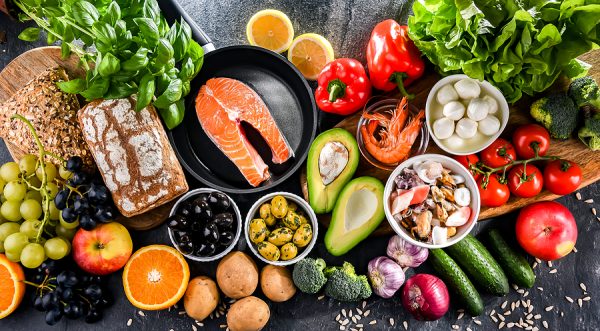Every year we see more and more evidence that the “Western” style of eating speeds up the aging process and leads to premature death. And sadly, this is how a large portion of the U.S. population eats. Our society seems to be addicted to commercial red meats, lunchmeat and hot dogs, refined grains, sugars and sweets.
At the same time, study after study proves to us that healthy dietary patterns not only extend life, they also reduce the risk of chronic disease. People who choose diets filled with more plant-based foods are less likely to die from cancer, cardiovascular disease, respiratory conditions and neurodegenerative diseases.
And you can get these life-extending benefits even if you start eating a healthy diet in your later years.
For example, a study out of Norway analyzed the impact of healthy food choices on life expectancy, depending on when people start eating them. While starting to eat healthy when you are younger has the most impact, they determined that men and women who start eating healthy at age 60 can still increase their lifespan by nine and eight years respectively.
And at 80? Both men and women could add about three and a half more years to their life.
I think that’s pretty amazing.
The diets that add the most years to life are those that focus on eating more fruits, veggies, legumes and nuts; and eating less red and processed meat, sugar and refined grains.
That sounds a lot like a Mediterranean style diet to me. So the life-extending benefits are exactly what I would expect.
What Can a Mediterranean Style Diet Do for You?
Eating a Mediterranean style diet is associated with all kinds of health benefits. It reduces your chances of heart disease, fatty liver, diabetes and obesity. It is anti-inflammatory. It supports brain function and boosts energy levels. And it’s an excellent way to shed pounds.
In fact, after about 18 months of sticking to the Mediterranean way of eating, you can potentially….
- Slash visceral fat – the kind that wraps around the organs deep inside your body – by 22%
- Experience a 29% drop in liver fat
- Decrease fat around your heart by 11%
- Lose between 1% to 2% of pancreatic fat
You may even be able to enhance the results by eating what is being called the “Green” Mediterranean diet.
In a nutshell, going “green” just means adding more high polyphenol foods and beverages like green tea, herbs, spices, berries and nuts to your diet. The Green Mediterranean diet also reduces red meat consumption even further than the regular Med diet.
Eating Like a Mediterranean Isn’t Your Only Healthy Choice
It probably won’t surprise you to learn that U.S. News & World Reports has ranked the Mediterranean diet as the best overall diet for six years in a row now. The Med diet also ranked highest in several other categories, including Best Plant-Based Diets, Best Diets for Bone and Joint Health, Best Diets for Healthy Eating, and Best Family-Friendly Diets.
Still, it’s not the only choice available to you. Other healthy, plant-based diets took the next three spots for best overall diets. These include:
The DASH diet, which stands for “dietary approaches to stop hypertension.” It was a front-runner, tied with the flexitarian diet for second place.
Like other healthy dietary patterns, it emphasizes fruit and vegetable intake. However, it also encourages eating six to eight servings a day of whole wheat foods like bagels, bread, cereal, rice and pasta. I’m not crazy about that part.
Still, it recommends replacing red meat with poultry or fish and is low in dairy, salt and added sugars. So while it’s not my top choice, it is a big step ahead of a standard Western diet.
The flexitarian diet is basically a “flexible vegetarian diet.” It’s a semi-vegetarian way of eating that supports getting most of your proteins from plant sources. But it also allows you to eat foods like fish, meats, eggs and other animal products to round out your protein intake when needed.
So eating in this way can support your protein needs while filling you up with nutritious, low-calorie and antioxidant-rich veggies.
Fourth on the list is the MIND diet. This is a combination of the Mediterranean and DASH diets, and is designed to reduce the rate of mental decline and protect against Alzheimer’s disease.
The key here is that it encourages eating brain-healthy foods like berries, green leafy vegetables, nuts, fish, beans and olive oil that support brain health. At the same time it discourages the consumption of red meat, butter/margarine, cheese and sweets.
Ultimately, the secret to slowing down the aging process and extending life is to increase the amount of healthy, plant-based foods that you eat while reducing the amounts of red and processed meat, sugar and refined grains in your diet. All of these diets accomplish that.
What I like about it, is that all of these diets are somewhat interchangeable. For example, if you get tired of eating like a Mediterranean, just switch over to a flexitarian pattern of eating for a few weeks. And if you get tired of that, check out the MIND diet.
Make it fun and turn it into a foodie adventure!
SOURCES:
Shan Z, Wang F, Li Y, Baden MY, Bhupathiraju SN, Wang DD, Sun Q, Rexrode KM, Rimm EB, Qi L, Tabung FK, Giovannucci EL, Willett WC, Manson JE, Qi Q, Hu FB. Healthy Eating Patterns and Risk of Total and Cause-Specific Mortality. JAMA Intern Med. 2023 Jan 9.
Fadnes LT, Økland JM, Haaland ØA, Johansson KA. Estimating impact of food choices on life expectancy: A modeling study. PLoS Med. 2022 Feb 8;19(2):e1003889.
Gepner Y, Shelef I, Schwarzfuchs D, Zelicha H, Tene L, Yaskolka Meir A, Tsaban G, Cohen N, Bril N, Rein M, Serfaty D, Kenigsbuch S, Komy O, Wolak A, Chassidim Y, Golan R, Avni-Hassid H, Bilitzky A, et al. Effect of Distinct Lifestyle Interventions on Mobilization of Fat Storage Pools: CENTRAL Magnetic Resonance Imaging Randomized Controlled Trial. Circulation. 2018 Mar 13;137(11):1143-1157.
Zelicha H, Kloting N, Kaplan A, Yaskolka Meir A, Rinott E, Tsaban G, Chassidim Y, Bluher M, Ceglarek U, Isermann B, Stumvoll M, Quayson RN, von Bergen M, Engelmann B, Rolle-Kampczyk UE, Haange SB, Tuohy KM, Diotallevi C, Shelef I, Hu FB, Stampfer MJ, Shai I. The effect of high-polyphenol Mediterranean diet on visceral adiposity: the DIRECT PLUS randomized controlled trial. BMC Med. 2022 Sep 30;20(1):327. Best Diets 2023. Copyright 2023 © U.S. News & World Reports.



